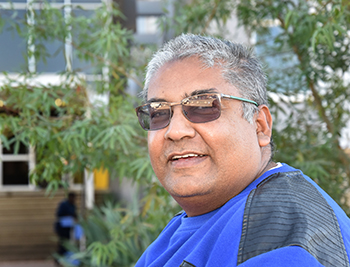Latest News Archive
Please select Category, Year, and then Month to display items
17 June 2020
|
Story Dr WP Wahl

The Division of Student Affairs (DSA) prioritises innovation to meet the challenges of food insecurity and malnutrition among students. To this end, several student volunteers and student governance structures are collaborating with the DSA on various initiatives.
During 2019, various conversations were held about the possibility of creating a health-promoting food environment at the UFS where students and staff are well informed and empowered to take appropriate action regarding their food and nutritional needs. These conversations resulted in an institutional strategy to address the food environment at the UFS. Student representatives serve on a technical committee that directs the implementation of this strategy. In this regard, several initiatives have already been launched.
Students from residences and other student communities have planted vegetable gardens on the Bloemfontein Campus with the assistance of KovsieACT and the Faculty of Natural and Agricultural Sciences. Students and staff are already harvesting and distributing vegetables to needy students every week. Measurements were put in place to continue this during the COVID-19 period. The following vegetables were planted: spinach, cabbage, beetroot, broccoli, cauliflower, and carrots.
Food parcels, donated by Tiger Brands and Gift of the Givers, are continuously handed out by DSA staff and student volunteers. In this regard, 540 food parcels have already been handed out on the Bloemfontein Campus during the COVID-19 period alone. During the same time, 117 students received food parcels on the Qwaqwa Campus. The innovation of this food parcel project rests on the fact that business, NPOs, UFS students, and DSA staff are collaborating to address food insecurity and malnutrition.
More collaborative initiatives will be implemented over the next 12 months. The DSA staff and students are already working with the Department of Dietetics and Consumer Sciences to create information packages about the preparation of low-budget nutritious meals.
Related article:
Vegetable tunnels established to continue the fight against food insecurity
Prof Solomon appointed to board of flagship journal of UNECA
2016-10-06

Prof Hussein Solomon, member of the Editorial
Board of the Afro-Arab Social and Economic
Review. He is also the author of Islamic State
and the Coming Global Confrontation.
Photo: Charl Devenish
“I cannot say I worked towards it – I just did my work, and I guess someone noticed.” These are the words of Prof Hussein Solomon from the Department of Political Studies and Governance at the University of the Free State (UFS), who was recently appointed to the Editorial Board of the Afro-Arab Social and Economic Review.
On an editorial board with people he quoted
This is the flagship journal of the United Nations Economic Commission for Africa (UNECA). The mandate of the Economic Commission for Africa (ECA) is to promote the economic and social development of the states which are regarded as members of the United Nations (UN). Prof Solomon says the board consists of people that he used to quote when he was a student, and to serve alongside them is a privilege.
Book launched in Greece, Japan, and Indonesia
His book, Islamic State and the Coming Global Confrontation, was earlier published by Palgrave Macmillan in London and launched in Greece, Japan, and Indonesia in June and July 2016 respectively. It analyses the origins and organisational structure of the Islamic State (IS), ans examines its military triumphs and success in securing new recruits via social media.
Exploit of IS vulnerabilities to combat organisation
Prof Solomon says the IS makes use of the winning hearts and mind (WHAM) principle where they earn the trust of residents by providing basic services, and the only solution we have is to “exploit the Islamic State’s vulnerabilities and to highlight their atrocities.”
He mentions that a lot needs to be done to overcome the IS. It is vital to have boots on the ground and an acceptance that countries will splinter. An overarching strategy needs to be in place which allows for regional variations, good governance, and the countering of extremism.